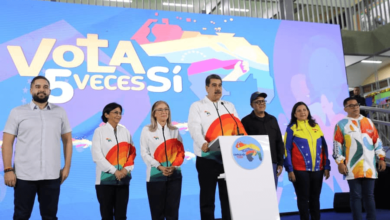Translated by Walter Lippman
Reposted from CubaDebate.cu
The president of the United States, Joe Biden, confirmed this Thursday the incorporation of Colombia as an extra ally in the North Atlantic Treaty Organization (NATO), a military alliance made up of 30 countries, after several weeks since that intention was announced, On March 10.
The official designation was confirmed this Thursday, when Biden sent a letter to the presidents of both chambers of the Capitol, stating: “I notify my intention to designate Colombia as an Important Ally outside NATO. I make this designation in recognition of the importance of the relationship between the United States and Colombia, and Colombia’s crucial contributions to regional and international security.”
In this way, the country presided over by Iván Duque will be able to access US war material and receive loans to acquire military and research equipment. It would also receive benefits to acquire space technology and could participate in operations with the US Department of Defense.
Other countries in the region, such as Argentina, were already members of the group under the same condition. That South American nation had joined NATO under the government of Peronist Carlos Menem, when he adopted a political model linked to Washington and a neoliberal economic system during the 1990s.
The new determination to include Colombia as an external NATO partner was made public at the beginning of last month, when Biden and Duque had a meeting at the White House.
Recently, when celebrating 200 years of relations between the two American countries, the Colombian president said that this “is historic.” And he added: “It means celebrating this bicentennial of the bilateral relationship, taking it to the highest point in our history.”
For his part, the US ambassador in Bogotá, Philip Goldberg, stated: “There is an alliance, a strategic friendship that continues and that we want to continue in the future.” In addition, the ten years since the Free Trade Agreement between the two nations entered into force were highlighted.
In March, when Washington’s determination was announced, the Venezuelan government questioned the incorporation of Colombia. Specifically, the foreign minister, Félix Plasencia, regretted that Duque turned his country “into a useful space for the threat.”
Maduro affirms that “those who prepared plans for the extension of NATO are the first to have responsibility” for the situation in Ukraine. In turn, he remarked: “We regret this for the Colombian people, our brothers, that the Government of Iván Duque become part of a forum like NATO”.
The differences between Caracas and Bogotá on this issue have been on the international agenda for many years. In fact, while Juan Manuel Santos governed, Nicolás Maduro publicly demanded that he desist from that policy: “Venezuela once again denounces before the international community the intention of the Colombian authorities to lend themselves to introducing an external military alliance in Latin America and the Caribbean with nuclear capability,” he said in 2018.
“We urge the Government of the Republic of Colombia to observe and comply with the international obligations to which it has committed itself as a member of regional organizations aimed at guaranteeing peace and the peaceful solution of disputes,” it maintained.




